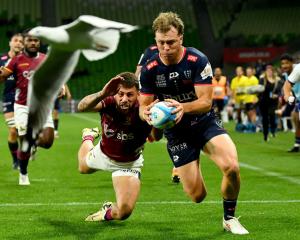
Chiefs coach Dave Rennie was unwilling to speculate on the severity of the knee injury suffered by Cruden in Friday night's win over the Crusaders, with some reports linking him to a lengthy lay-off.
Cruden went down without contact midway through the first half of the Chiefs 26-9 victory in Christchurch, receiving treatment on the field before limping to the sidelines.
The first five will undergo a scan at 2.30pm to assess the exact damage, with Rennie ruling Cruden out of only Friday night's clash with the Force.
"Gut feel is he's not playing this week, but he wasn't going to be playing anyway as part of the All Blacks rotation," Rennie said. "There's a potential that it could be a long-term injury but we'll wait until the specialists tells us what's going on."
The injury is to the same knee as Cruden hurt in the 2011 World Cup semifinal, though that was a hyperextension. The ailment this time around came from lateral movement as Cruden changed direction, which suggested a problem with the anterior cruciate ligament.
If Cruden has ruptured his ACL, he could be on the sidelines for around six months, which would all but rule him out of the All Blacks' title defence in England.
"A worse cast scenario could be a long-term injury but we won't speculate until we know," Rennie said. "I'm not a doctor. I don't want to speculate so we'll know more in the next couple of days."
Chiefs prop Jamie Mackintosh told Radio Sport on Sunday night the Chiefs are fearing the worst, which could mean time on the sidelines for the remainder of the rugby year.
However there is hope in an anterior cruciate ligament transplant option that's succeeded with AFL players.
"You can get surgery [and receive] a dead person's ACL and if it does really well and takes to the knee you can actually get that playing in six to eight weeks, which is pretty unbelievable," Mackintosh said.












